As a sideman André Condouant appears on:
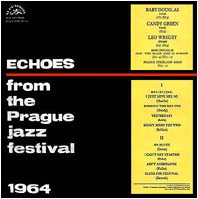 click to enlarge 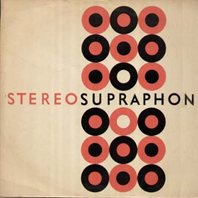 SUPRAPHON SV 9005 click to enlarge |
 click to enlarge 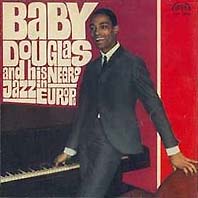 EP SUPRAPHON SUK 35628 |
Echoes From The Prague Jazz Festival 1964 / Various Artists recorded: October 30, 1964 live in Prague, #B3,4 November 3, 1964 at Supraphon studio issues: 1964 SUPRAPHON ST 55633 (Czech); 1964 or `65 SUPRAPHON SUA 15633; 1965 LP SUPRAPHON SV 9005 (CSSR 1st stereo original, red/silver label, FLC) also issued as: Ozveny Jazzoveho Festivalu Praha 1964 SUPRAPHON DV 10166 ; Czechoslovakian Jazz / Various Artists SUPRAPHON SV 9005 #A1 & #B1 also on Baby Douglas And His Negro Jazz In Europe, 1965 EP SUPRAPHON SUK 35628 (mono) (CSSR) DONALD "BABY" DOUGLAS (voc #A1,B3); CANDY GREEN (voc #B1?,4; p); BENNY BAILEY (tp #B2); ZDENEK PULEC (tb #B4); LEO WRIGHT (as #A2, B4) or (as #A2, B1-4; fl #A2) ? ; KENNY DREW (p #A3); ANDRÉ CONDOUANT (g #A4); ROLAND HAYNES (b); FRED BRACEFUL (dr); PRAGUE DIXIELAND BAND /w K. KRAUTGARTNER (#B3,4); BABY DOUGLAS & THE BLACK JAZZ IN EUROPE (#A1-4, B1,2)
|
||
| Original liner notes |
| Towards the end of October 1964, the first International Jazz Festival took place in Prague. A number of the foremost European ensembles ans soloists participated. The United States, the cradle of Jazz, was represented by a group of Afro-American soloists who live at present in Europe and whom the singer Donald 'Baby' Douglas organized into a group for the express purpose of participating at the Festival. Douglas, who is 27, comes from LA and is at present studying the piano and cello at the Royal Academy of Music in Stockholm. He is the vocalist of the well-known Swedish Jazz Orchestra headed by Putte Wickman, with whom he visited Czechoslovakia in 1963. It was then that he promised to revisit Prague in the company of a group of eminent Afro-American Jazz soloists, and he fulfilled that promise on the occasion of the Jazz Festival Praha 1964. Leo Wright, an alto-saxophonist and flutist who came to Prague from West-Berlin (where he played in a night-club), was really the star of this ad hoc group and its virtual leader. Wright was born in Texas in 1933 and so far has played in several leading orchestras including those of Charles Mingus and Dizzy Gillespie. His perfect phrasing and easy fluency of playing won him a multitude of admirers during his stay in Czechoslovakia. Wright is the soloist (flute) in James Moody´s composition 'Dobbing The Red Fox'. The second member of the melody section was Benny Bailey, the 40-year-old trumpeter from Cleveland/Ohio, who is at present a member of the Munich Radio Orchestra. Bailey has been a professional performer for 24 years and has been with such Jazzmen as Jay McShann, Dizzy Gillespie, Lionel Hampton, Quincy Jones and Harold Arnold in Sweden. | He proves his extraordinary art in Gershwin´s 'I Can´t Get Started'. Kenny Drew, one of the most distinguished personalities in contemporary Jazz, was the pianist of the group. He has played with Coleman Hawkins, Lester Young, John Coltrane, Charlie Parker and other soloists. Born in New York in `28, he came to Prague from Copenhagen where he was playing at the time of the festival. Kenny Drew´s playing is not spectacular but his well-thought-out accompaniments are highly functional. He is heard as a soloist in Kern´s song 'Yesterdays'. Other members of the rhythm group included André Condouant (guitar) from Martinique [which is wrong, he´s from Guadeloupe!], a former partner, in Paris, of the organist Lou Bennett, the young Parisian bassist Roland Haynes and Fred Braceful, the drummer, who lives in the German Federal Republic. Singers Baby Douglas and 'Dr. Blues' Candy Green each contributed a song to the programme: Douglas sang Charlie´s foxtrot 'Hallelujah, I Just Love Her So' and Candy Green, who also plays the piano, 'Mr. Blues'. Since all the members of this ad hoc group live in different European cities and met in Prague for the first time just before the opening of the festival, they did not include in their programme any very complicated arrangements but concentrated instead on individual solo performances. Two pieces, however, were recorded by Baby Douglas and Leo Wright accompanied by the leading Prague amateur ensemble, the Prague Dixieland Band. These recordings, made in the Supraphon studio, will certainly be a welcome addition to the record library of any lover of good Jazz. | ||
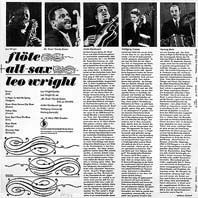 |
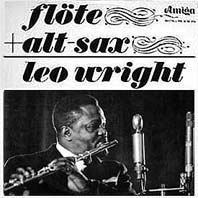 click images to enlarge |
Flute + Alto-Sax / Leo Wright recorded: March 10, 1965 live in Dresden issued: 1965 (or 67?), AMIGA 850 056 (mono), 855 056 (stereo) (Ex-East-Germany) LEO WRIGHT (fl, as); "DR. BLUES" CANDY GREEN (p, voc, hca); ANDRÉ CONDOUANT (g); WOLFGANG KRAESSE (b); HARTWIG BARTZ (dr)
#A1 is actually entitled Loose Walk, sometimes Stitt´s Tune |
||
| Liner notes von Karlheinz Drechsel |
| Leo Nash Wright, Candy 'Dr. Blues' Green und André Condouant gehören zur kontinuierlich anwachsenden Schar jener Jazzmusiker, die - aus Gründen der Rassendiskriminierung wie auch wegen der allgemein um sich greifenden wirtschaftlichen Misere des Jazz - ihren Wohnsitz von den USA nach Europa verlegt haben. André Condouant kommt von den Karibischen Inseln. Nach einigen Jahren Zwischenstation in New York, ging er 1954 nach Europa (er lebte 8 Jahre in Paris), wo er heute zu den vielversprechendsten Jazz-Gitarristen zählt. Candy Green ist gebürtiger Texaner, seine Wiege stand in Houston. In den Industriezentren des Nordens prägten der Jump-und-Shout-Stil, der Boogie Woogie und der ebenso harte wie flüssige Kansas-City-Swing sein Profil als Sänger und Pianist. Seine Vortragsart stellt eine eigenartige Mischung aus derber Blues-Realistik und eleganter Nachtklub-Atmosphäre dar. Der in Amerika erworbene Beiname 'Dr. Blues' spricht für sich. Leo Wright, spiritus rector und künstlerischer Mittelpunkt des eigens für das DDR-Gastspiel formierten Ouintetts, kommt ebenfalls aus Texas, dem Herkunftsland zahlreicher namhafter Blueskünstler und Jazzmusiker. Am 14.12. 1933 in Wichita Falls geboren, erhielt er schon im Kindesalter von seinem Vater, einem Saxophonisten in einer Rhythm & Blues Band, den ersten Saxophonunterricht. In der örtlichen Highschool-Band nahm die musikalische Entwicklung festere Formen an. Besondere Leistungen verhalfen Wright zu einem Stipendium an einem Texas-College, nach dessen erfolgreicher Absolvierung er sein Glück an der Musikakademie in San Francisco versuchte, Die hohen Studiengebühren machten diesen Plan zunächst zunichte; er arbeitete deshalb einige Jahre als Altsaxophonist in San Francisco, bis die dadurch erzielten Ersparnisse endlich den Wunsch seines Lebens in Erfüllung gehen ließen. Das Saxophon-Studium erforderte jedoch, Iaut Schulgesetz, das zusätzliche Erlernen eines 'klassischen' Musikinstruments. So griff Leo Wright, obgleich sehr ungern, zur Flöte. Bis heute sieht er das Altsaxophon als sein 'eigentliches' Instrument an, weshalb es geradezu kurios anmutet, daß ihm ausgerechnet die Flöte immer wieder als Sprungbrett in seiner Laufbahn diente und die internationale Jazzkritik weit mehr den Flötisten als den Saxophonisten beachtet. Die Flöte verhalf Wright während der Wehrdienstzeit zur Aufnahme in ein Armee-Ensemble, dessen künstlerische Skala sich von der Sinfonik und Oper bis zur Jazz-Combo erstreckte, für Leo ein außerordentlich nützlich gewesenes 'Exerzierfeld'. Es war auch die Flöte, die ihm 1958 in New York ein Engagement bei Charles Mingus brachte und die ihn 1959 Mitglied des weltberühmten Quintetts von Dizzy Gillespie werden ließ. Speziell dieses Engagement machte den Namen Leo Wright über Nacht international populär: unermüdlicher Fleiß und Lerneifer hatten endlich ihren wohlverdienten Lohn getunden. Als Gillespie 1962 sein Quintett während einer Europa-Tournee überraschend auflöste, kehrte Wright nicht in die USA zurück. Seitdem erfreut sich sein überragendes Können in Jazz-Clubs, bei Konzerten und Festivals, bei Platten-, Funk- und Fernsehgesellschaften zwischen Stockholm und Rom, Paris und Prag immer größerer Wertschätzung. Während er als Flötist, er zählt heute zu den weltbesten seines Faches, einen gönzlich eigenen Weg geht, verfolgt er als Altsaxophonist in gerader Linie die klassische Charlie Parker-Schule. Er beherrscht sein Handwerkszeug aus dem FF, hat endgültig seinen Stil getunden und steht über den Dingen. | Sein modernes, tief im Blues verwurzeltes Spiel, besticht durch die Klarheit des Aufbaus und der künstlerischen Aussage. Mit aggressivem Ton (auch er erinnert an Parker) steuert Leo Wright harmonisch exakt gebunden und gerade auf sein Ziel zu, unter Vermeidung endloser Chorusse, 'handfest' und fern von avantgardistischen Experimenten. Wright sagt seibst zu seiner Musik: "lch spiele so, wie ich es in meinem Innern empfinde. Warum soll ich, nur um supermodern zu erscheinen, mich und damit auch mein Publikum belügen?" Die westdeutschen Rhythmiker Wolfgang Kraesse und Hartwig Bartz sorgen in erster Linie für einen soliden Grund-Beat. Noch vor wenigen Jahren stand Hartwig Bartz als Schlagzeuger an der Spitze des westdeutschen Jazz-Poll (damals im Albert Mangelsdorff-Quintett), bis ihn eine schwere Krankheit zum Pausieren zwang. Jetzt steuert er offensichtlich seinem Comeback zu, was diese Aufnahmen deutlich belegen. Mit dem hart, zügig und gelöst gespielten 'Encore', das quasi als Solisten-Visitenkarte überreicht wird, besitzt die Platte einen außerordentlich geglückten und vehementen Auftakt. Wir spüren jenen erfrischenden Zug van Jam-Atmosphäre, den leider so manche Jazz-Veranstaltung vermissen läßt, wie er jedoch dem gesamten Dresdener Konzert sein Gepräge gab. Das balladeske 'It Might As Well Be Spring' stellt das hervorragende Können des Flötisten Leo Wright in den Mittelpunkt, sein Gefühl für dynamische Nuancierungen, seinen Sinn für zarte Töne, die er geschickt und geschmackvoll mit kraftvollen Passagen zu mischen versteht. Die Iyrischen Filigran-Figuren von André Condouant sowie das initiative Zusammenspiel des Quintetts vervollständigen den vielapplaudierten Gesamteindruck. Vitale Blues-Atmosphäre à la Chicago und Kansas City bescheren dem 'Down Home Kansas City Blues' (Text und Musik von Candy Green), 'Kidney Stew' und die in ungewöhnlich schnellem Tempo vorgetragene Memphis Slim-Komposition 'Every Day I Have The Blues'. Hier ist vor allem 'Dr. Blues' in seinem Element, und wie er auf der Claviola, ganz in der Art der Mundharmonika-Blueskünstler der Südstaaten, sein 'Down Home' mitreißend zu interpretieren versteht, das ist eine Klasse für sich. Leo Wright versteht sich als Begleiter wie auch als Solist dem Gesamtcharakter ausgezeichnet anzupassen, wobei man sein Alt-Solo in 'Kidney Stew' als Musterbeispiel eines von Herzblut erfüllten Blues-Chorus bezeichnen darf. André Condouant zeigt, abgesehen von seiner enormen Technik und seinen vielfältigen Ideen als Solist, wie weit die Anwendungsmöglichkeiten der Gitarre gezogen sind, um einer kleinen Besetzung möglichst vielseitige Schattierungen zu verleihen (Gegenstimme im Sinne des Ruf-Antwort-Prinzips, 'BIäser'- Funktion im Satzspiel, emotioneller Steigerungseffekt in Riff-Passagen u.v.a.m.). Bei dem von Flöte und Gitarre unisono vorgestellten 'Blues March', dessen Melodik der Blueskolle tion dieser Platte eine recht reizvolle Variante gibt, verblüfft Leo Wright mit seinem Vermögen, die Flöte in ein 'heißes' Instrument zu venwandeln, überraschend auch das modern angehauchte Solo Candy Greens, wozu offensichtlich André Condouant mit seinem vorausgegangenen Chorus aus Akkord-Attacken und Einzeltönen die Inspiration verlieh. Mit Gillespie's traditionsreichem 'Groovin´ High' kommen noch einmal alle Solisten zum Zuge, auch Hartwig Bartz, der im 8-8-Wechsel über 80 Takte seine blendende Technik demonstriert. Leo Wright spielt den ausgedehntesten Alt-Chorus des Konzertes, mit dem er nur unterstreicht, daß er einer der bemerkenswertesten Jazzmusiker unserer Tage ist. | ||
| Rare live recordings of Leo Wright-Combo behind the iron curtain in East Germany in the middle of the 60ies! This is the second part of the Dresden-concert at 10 March 1965. The first part was released as 'Flute + Alto-Sax'. | 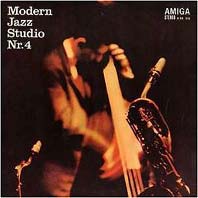 |
Modern Jazz Studio Number 4 / Leo Wright recorded: March 10, 1965 live in Dresden issued: P & C 1965/70, AMIGA 855 215 (stereo) (Ex-East-Germany) LEO WRIGHT (fl, as); "DR. BLUES" CANDY GREEN (p, voc, hca); ANDRÉ CONDOUANT (g); WOLFGANG KRAESSE (b); HARTWIG BARTZ (dr)
|
||
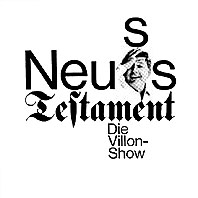 first double-LP issue
|
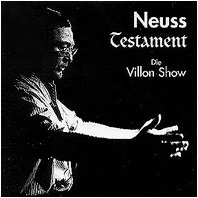 click images to enlarge
|
Neuss Testament - Die Villon Show / Wolfgang Neuss recorded: 1965 in Berlin original issues: 1966, LP PREISER SPR 3118 (Austria) ; LP FONTANA 885246 TV. (Originally recorded by PHILIPS, first issued as double-LP, later as shortened single-LP). re-issue: May 1997, CD CONTRÄR MUSIK CON 4306-2 (Indigo Distribution) WOLFGANG NEUSS rezitiert Texte nach/recitates poems according to François Villon von/by Horst Tomayer, Thierry, Jens Gerlach, Gerd Delaveaux, Wofgang Neuss, musikalische Begleitung/musical accompaniment: FATTY GEORGE (cl); FRITZ PAUER (p); ANDRÉ CONDOUANT (g); HANS RETTENBACHER (b); HARTWIG BARTZ (dr)
'Take Five', 'Mack The Knife' und andere unbenannte Stücke wurden zu den Rezitationen gespielt. Diese Studio-Aufnahme stammt ursprünglich von Philips und erschien zunächst als Doppel-LP bei Preiser (nicht in Deutschland!) mit weissem Cover, später in gekürzter Form als Einzel-LP mit dem Cover links. Die Playlist oben bezieht sich auf die CD-Ausgabe, die Einzel-LP enthält nur die Tracks 1-19 und 'Unter die Strafe gestellt' & 'Ballade von der quicken Lüge'. Neuss Testament hatte Ende September 1965 Premiere im Theater am Kurfürstendamm in Berlin. 1966 lief es auch im kleinen Theatersaal der Kongresshalle in folgender Besetzung: FATTY GEORGE (cl); LEO WRIGHT (as, fl); FRITZ PAUER (p); ANDRÉ CONDOUANT (g); HANS RETTENBACHER (b); JIMMY PRATT (dr); dort wurden Ausschnitte vom Fernsehen des Hessischen Rundfunk HRFS 3 aufgezeichnet. Der Mitschnitt ist heute leider nicht mehr erhalten. |
||||
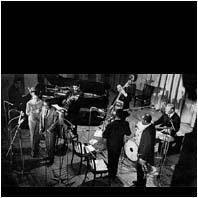
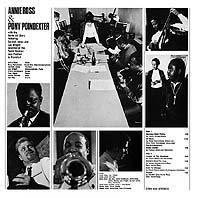 |
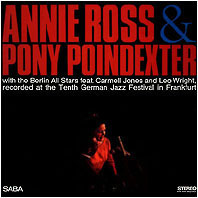 click images to enlarge 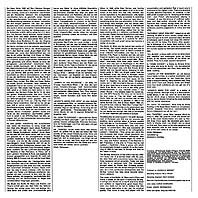 |
At The 10th German Jazz Festival Frankfurt / Annie Ross & Pony Poindexter with the Berlin All Stars featuring Carmell Jones and Leo Wright recorded: May 1, 1966 live in Frankfurt/Germany issues: SABA SB 15082 ; MPS 15082 ; BASF/MPS CRM 619 FOC ; BASF/MPS 21 20619-1 re-issues: 1968, LP POLYDOR 583711 (UK) ; October 27, 2003 CD MPS Records (Universal) (Most Perfect Sound Edition Series) #A2 also on Talkin’ Jazz - Themes From The Black Forest Vol. 1 1993, MPS521199-2 ; CD POLYDOR 521199-2 ; CD MPS 731452119926 ; 1994, CD/LP TALKIN' LOUD RECORDS 518 861 (UK) see >> disco 3 ANNIE ROSS (voc #A1, 3, #B1-4)); PONY POINDEXTER (as #B4; ss #A2; voc #A2,3, #B1,3); CARMELL JONES (tp); LEO WRIGHT (as #A3,B1; fl #B4); ANDRÉ CONDOUANT (g); FRITZ PAUER (p); JIMMY WOODE (b); JOE NAY (dr)
Info-Text zum CD-Release in Deutsch >> Quelle: Jazzeit |
||||
| Liner notes from the Polydor issue |
| Vocalists play so small a part in the swift development of European jazz that one can scarcely say anything more positive about a female vocalist than that she is ''Un-European". This compliment is fully deserved by Annie Ross who, one often forgets, is Londonborn. She was successful all over the world as a member of the unforgettable Lambert-Hendricks-Ross group and she's the only European jazz singer whose popularity can be compared to her American colleagues. New Orleans-born Pony Poindexter began his career at the "Jazz and Poetry" sessions of the Beatniks in San Francisco. It was also in Frisco that he met Lambert-Hendricks-Ross, a group with which he occasionally formed a quartet. Since the beginning of 1965 he has been in Europe and lives on the island of Ibiza. The Bebop revolution of the Forties had two different faces, one of a radical break with the past, the other filled with a scurrilous humour that sometimes appeared almost eccentric. Today one sees all this in a mellower light. The innovations brought about by Parker and Gillespie appear, when compared with the abrupt changes in today's Jazz, as a slow continuous development, and the Bebop humour has long since become everybody's pleasure. The music of the Berlin All Stars and of Pony and Annie is based on the spirit of humourous Bebop. It swings and moves, full of esprit and funny ideas, and radiates an imperturbable good mood. However, one must not be led to believe that this happy mood diminishes in any way the artistical quality. This music is sung and played with the concentration and perfection that is found only in musicians of the highest order. There are moments of great, genuine inspiration, for instance in Carmell Jones' trumpet solo in 'Jumping at the Woodside', and Pony's alto-saxophone playing in 'Twisted'. It was this mixture of undiluted joyfulness and high-calibre virtuosity which, at the Frankfurt Jazz Festival, during which this recording was made, | brought about one of the few unanimously positive judgements of critics and fans alike. 'Saturday Night Fish Fry', based on an old, amusing 78 of Louis Jordan, brings back to mind that jazz at its birth absorbed many elements of Folk music and it shows how ciose this relationship can still be today. The theme, often appearing in Folk songs of a happy feast, ending in violence and outrage and the recurring chorus make this number appear as folkmusic emancipated into jazz. 'All Blues', a blues waltz written by Miles Davis with beautiful and meaningful Iyrics by Oscar Brown, is the feature number of the whole ensemble. Pony here plays soprano saxophone. In 'Home Cookin', a theme by Horace Silver, the Iyrics are sung by Annie. Leo accompanies on the alto saxophone and Pony does some fantastic scatting. 'Jumpin' At The Woodside', an old famous Count Basie number, is a typical vocalisation built onto an instrumental by Jon Hendricks. Annie sings a tongue-breaking, many syllabled text, Pony does some more scat singing. Jones and Wright show how much substance you can get out of a short solo. 'Moody's Mood For Love' is a ballad of strange charm. Although sung in a characteristic ballad tempo, it still has room for some fast Bop figures. Annie sings a famous tenor saxophone solo by James Moody following the notes faithfully with her typical assurance. For 'Goin' To Chicago', once sung by Jimmy Rushing in the Basie Band, there's no comparison. Annie's snappish coloratura commentaries to Pony's statements are all her own. With 'Twisted', Annie Ross became world-famous in 1952. Her great hit which she penned herself is the vocal transformation of a solo by Wardell Gray. Once again the ensemble gets an opportunity to display itself. Leo Wright can be heard on flute and Pony plays on alto saxophone the most beautiful solo on this record and certainly one of the best solos of his career. | ||
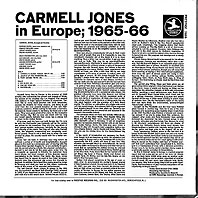 |
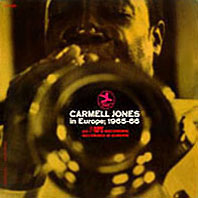 click images to enlarge |
Carmell Jones In Europe 1965-66 / Carmell Jones recorded: 1965 - 66 issued: 1969, PRESTIGE PRST-7669 #A2& #B3 from At The 10th German Jazz Festival Frankfurt / Annie Ross & Pony Poindexter (SABA/MPS) see above ; other tracks from The Hip Walk / Nathan Davis (SABA/MPS) see >> Carmell's disco 3 CARMELL JONES (tp); NATHAN DAVIS (ts, ss A#1,3; B#1,2); LEO WRIGHT (as A#2; B#3); PONY POINDEXTER (as, voc A#2; B#3); FRANCY BOLAND (p A#1,3; B#1,2); FRITZ PAUER (p A#2; B#3); ANNIE ROSS (voc A#2; B#3); ANDRÉ CONDOUANT (g A#2; B#3); JIMMY WOODE (b); KENNY CLARKE (dr A#1,3; B#1,2); JOE NAY (dr A#2; B#3)
|
|||
| Actually
this was a performance of the LOU BENNETT TRIO, J. Griffin came to the club accidentally and joined the group. This is a bootleg, which is not available anymore ! If you want a copy, send a mail to: romeosfavorite@gmx.de |
 click image to enlarge |
Body And Soul / Johnny Griffin Quartet recorded: 1967 live at "Le Chat Qui Pêche" in Paris issued: 1990, MOON MCD 004 -2 JOHNNY GRIFFIN (ts); LOU BENNETT (org); ANDRÉ CONDOUANT (g); JOE NAY (dr) 1. Body And Soul (Green / Heyman / Sour / Eyton) 2. Leave Me Alone Blues (Griffin) 3. The Man I Love (Gershwin) |
|||
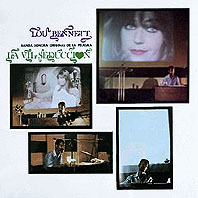 click images to enlarge click images to enlarge
|
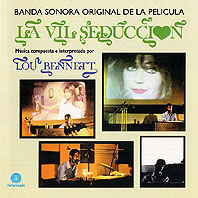 FONOMUSIC CD-1399 FONOMUSIC CD-1399
|
La
Vil Seducción / Lou Bennett Original Soundtrack composed by Lou Bennett recorded: August 23, 1968 at Studio Moro, S. A./Spain issues: 1968, SONOPLAY S-26.017 ; 1997, FONOMUSIC CD-1399 LOU BENNETT (org); ANDRÉ CONDOUANT (g); PEER WYBORIS (dr) 1. Movimiento (Movement) 2. Poema (Poem) Bossa-Nova 3. Seduccion (Seduction Blues) 4. Tema Para Alicia (Theme For Alicia) 5. Adios, Doña Inés (Goodbye, Doña Inés) 6. Nostalgia (Blue Nostalgie) 7. Indecision - Final (Indecision - Ending) |
|||
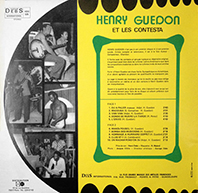 click image to enlarge click image to enlarge |
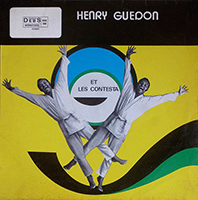 click image to enlarge Georges Debs (art dir.); R. Malard (artwork); Jacques Cilirie (photos) |
Henry Guédon Et Les Contesta recorded: 1969 in Guadeloupe ? issued: 1969 LP Disques DEBS International HDD 535 (Sonodisc Distribution) HENRI GUEDON (perc); ANDRÉ CONDOUANT (g, comp. #B9); ALAIN JEAN-MARIE (p); SOLO GONCALVES (tp) ?; HENRI DEBS (rec. eng.)
Note: Vogue was the French distribution label for Casablanca |
|||
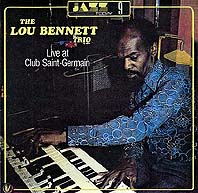 click image to enlarge |
Live At Club Saint-Germain / Lou Bennett recorded: 1978 live in Paris issued: 1980, VOGUE P.I.P. 502609 LOU BENNETT (org); ANDRÉ CONDOUANT (g); BILLY BROOKS (dr)
Note: Vogue was the French distribution label for Casablanca |
||||
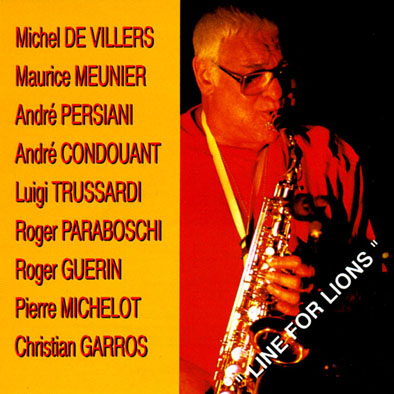 click image to enlarge |
Line For Lions / Michel De Villers & Co. recorded: 1984 issued: 1993 as Michel De Villers And Co. RDC 40026; 1994 (or 96 ?) as Line For Lions RDC 400262 MICHEL DE VILLERS (as, bar-s); ROGER GUERIN (tp); MAURICE MEUNIER (cl); ANDRÉ PERSIANI (p); ANDRÉ CONDOUANT (g); LUIGI TRUSSARDI, PIERRE MICHELOT (b, voc); ROGER PARABOSCHI, CHRISTIAN GARROS (dr)
|
|||
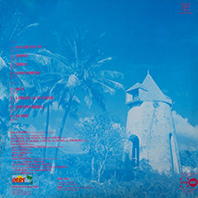 click image to enlarge click image to enlarge |
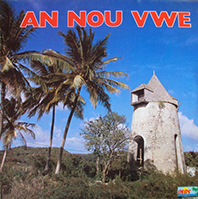 click image to enlarge click image to enlarge |
An Nou Vwe Vol. 2 / Ramon Pyrmée recorded: issued: 1988 LP DEBS HDD 2448 (France) Ramon Pyrmée (arr., b, g, p, vos, synth.); Patrick Artero (tp);Thierry Durell (tb); Saxophone – Alain Hatot (sax); André Condouant (g #B2, B4); Eddy Miath, Féliciane Norlise*, Tony Potriza* (voc); Christiane Obydol, Dominique Zorobabel, Eric Brouta, Jane Fostin, Willy Salzedo (chorus); Drums – Daniel Kissoun (dr); Frédérick Caracas, Tony Lodin (sequ.)
|
|||
| 18 Karats / Tony Lodin recorded: 1992 issued: 1992 DEBS TONY LODIN (dr); RONALD TULLE (p); RAYMOND D'HUY (b); ANDRÉ CONDOUANT (g); ALLEN HOIST (ts); PHILIPPE SLOMINSKY
|
||||
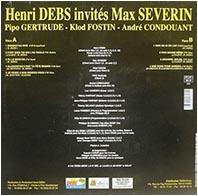 |
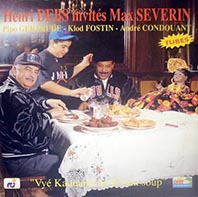 |
Vye Kannanri Ka Fe Bon Soup / Henri Debs Artiste Invité Max Severin, Pipo Gertrude, Klod Fostin, André Condouant issued: 1994 CD DEBS HDD 1357-1 (Guadeloupe) ANDRÉ CONDOUANT (g #1,2); Thierry Delannay (rhythm-g); Luc Léandry, Thierry Fanfant (b); Jean-Philippe Fanfant (dr); Henri Debs (prod.)
|
||
| Maurice Meunier (1925-1990), C'est au lendemain de la guerre que, grâce et avec Django Reinhardt qui savait choisir ses partenaires, Maurice Meunier commence sa brillante carriere de clarinettiste et saxophoniste de Jazz. Encense, entre autre, par les articles de la revue Down Beat, Meunier est aujourd 'hui encore considere comme le meilleur clarinettiste de Jazz Français. Benny Goodman qui admirait la delicatesse de son jeu ne manquait aucune occasion de venir l'ecouter et joner avec lui dans des improvisation dont les habitues de la Rose Rouge se souviennent encore. Chef d'orchestre attitre du celebre Club Saint-Germain ou il remplace Stephane Grappelli, Meunier a joue et même enregistré avec ce qui "fait" le Jazz: Django Reinhardt, Henri Crolla, Pierre Fouad, Léo Chauliac, Emmanuel Soudi-eux, Michel de Villers, Andre Persiani, Martial Solal, Stephane Grappelli, Maurice Vander, Raymond Fol, et encore avec: Lionel Hampton, Charlie Parker, Chet Baker, Kenny Clarke, Roy Haynes... pour n'en citer que quelqueuns. Maurice Meunier, clarinettiste au phrase elegant, | 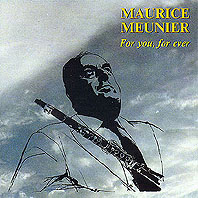 click image to enlarge
|
For You For Ever / Maurice Meunier issued: July 9, 1996, RDC 40020.2 (Mélodie Distribution) #12 also on Rêve De Guitare / Various Artists INCA MUSIC 547058 >> see disco 3 MAURICE MEUNIER (cl); ANDRÉ CONDOUANT (g #1-4,6,12,14); DIDI DUPRAT (g #5,10, 11,13); ANDRÉ PERSIANI (p #7,9); MARCEL AZZOLA (acc #5, 8,10-11,13); LUIGI TRUSSARDI (b #1-4,6,12); HENRI TILCHIT (b #5,10-11,13); BERNARD TESSIER (b #7,9); ROGER PARABOSCHI (dr #1-4,6-7,9,12)
|
|||
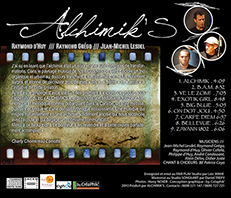 About Alchimik'S est né en 2002 à l'initiative de Raymond d'Huy et de Jean-Michel Lesdel. Aujourd'hui, c'est l'histoire d'une rencontre décisive entre 3 musiciens vibrant à l'unisson. Chacun porte une expérience de compositeur et d'interprète, de soliste et d'accompagnateur. Leur palette de couleurs infiniment complémentaire se traduit par un répertoire original, un son chaud, une flamme qui enthousiasme le public dès les premières notes. |
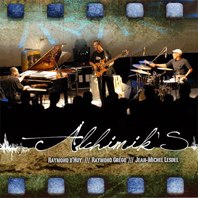 click images to enlarge |
Alchimik’S / Raymond d'Huy, Raymond Grégo, Jean-Michel Lesdel recorded: 2009 Fair Play Studio by Loïc MAHE issued: 2010 ALCH 001 JEAN-MICHEL LESDEL (p), RAYMOND d’HUY (b), RAYMOND GRÉGO (dr) & OLIVIER CAFAFA (sax); PHILIPPE d’HUY, ANDRÉ CONDOUANT (g); PATRICE COYO (voc); ALAIN DÉLOS, DIDIER JUSTE (perc)
|
||
video: http://www.youtube.com/watch?v=yCQTrVpLBMU ALBUM EGALEMENT DISPONIBLE EN TELECHARGEMENT |
| Henri Debs biography: A Guadeloupian entrepreneur who began his career as a biguine artist and gained renown as the creator of a style dubbed 'biguine kombas.' Currently he is best known for his studio in Point … Pitre, Guadeloupe, known sometimes as Studio Zouk La Terreur. As a former musician, he is more involved in the production of The Debs stable of stars than most record producers, especially his brother Georges who owns the now-defunct Georges Debs label out of Martinique. With his background and resources, he occasionally indulges himself by performing and releasing compilations of classic Antilles music, usually a bit on the overly sentimental side. |
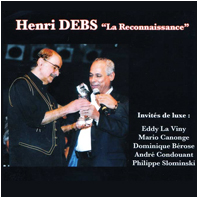 click image to enlarge |
La Reconnaissance / Henri Debs issued: October 29, 2011 CD DEBS 3042 HENRI DEBS accompanied by MARIO CANONGE, DOMINIQUE BÉROSE (#1, 4-5, 12, 14, 16-17), ANDRÉ CONDOUANT (g), PHILIPPE SLOMINSKI, EDDY LA VINY, ERIC MAXIMILIEN, TONY LODIN 1. Mary-Line / Henri Debs 2. A Paris Ou Rio / H. Debs & Eddy La Viny 3. Le Chemin De Tes Bras / Henri Debs 4. Sé Jou An Nou / Henri Debs 5. Es Ou Sonjé / Henri Debs 6. De Tout Mon Coeur / H. Debs & André Condouant 7. Élégie / Henri Debs 8. Toi Et Moi Sur La Plage / H. D. & Mario Canonge 9. Plaisir / Henri Debs 10. La Musique Des Stars / Henri Debs 11. My Island / H. Debs & Mario Canonge 12. Mandé Nouvel / Henri Debs 13. Happy Heart / H. Debs & Philippe Slominski 14. Tu Me Disais / Henri Debs 15. Rainbow In Your Eyes / Henri Debs 16. Une Fos C'est Peu / Henri Debs 17. Manman Sé Tout / Henri Debs |
iTunes: http://itunes.apple.com/at/album/la-reconnaissance/id436227189 ALBUM EGALEMENT DISPONIBLE EN TELECHARGEMENT |
Thanks to: Mr. Junichi Harada (Le Studio, Japan) for infos about the Amiga recordings, Mr. Kondo for the "Echoes" scans and Mr. Pete Fallico for the Fonomusic scan! |
| < previous |
l | next > |

